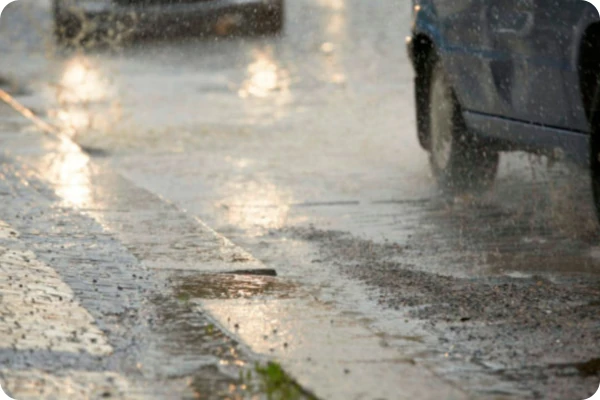Stormwater runoff, the excess water that flows over land during heavy rain, is a major concern in urban and commercial areas. When rainwater accumulates on impervious surfaces like rooftops, driveways, and parking lots, it can’t naturally seep into the ground, leading to problems like flooding, erosion, and habitat destruction.
Proper stormwater management is essential for property development to prevent these issues and comply with local regulations. Below are five proven methods for managing stormwater runoff volume that we can help you implement.

Infiltration Trenches
Infiltration trenches help manage stormwater by directing water into the soil. These shallow, gravel-filled trenches, typically 3 to 12 feet deep, collect runoff and allow it to naturally infiltrate the ground. However, their effectiveness depends on factors such as soil type, nearby buildings, and land slope.
While infiltration trenches are often used in combination with other techniques to handle large amounts of water, they are a sustainable solution that reduces waste and recharges groundwater supplies.
Permeable Pavement
An alternative to traditional impervious surfaces, permeable pavement allows water to pass through its surface. Designed with spaces in the pavement and installed over an aggregate base, this material lets water soak through, reducing runoff and promoting natural filtration into the soil.
This method prevents water accumulation on driveways, parking lots, and roads, making it a smart choice for areas prone to pooling water.
Underground Detention Facility
When space is limited, underground detention systems offer an excellent solution. These below-ground structures, typically installed beneath parking lots or roadways, collect stormwater and release it gradually into a sewer system or natural waterway. This method effectively controls the quantity of stormwater runoff while protecting local water bodies from contamination.
At iSTORMWATER, we provide maintenance services for underground detention facilities, ensuring they function efficiently to protect your property. Contact us today to schedule an appointment in Maryland, Virginia, or Washington, DC.
Permeable Pavers
Similar to permeable pavement, permeable pavers are individual units designed with gaps between them to allow water infiltration. These pavers are typically installed over an aggregate base that filters and directs water into the soil, reducing runoff. They can also be paired with underground storage systems to harvest and reuse stormwater.
This sustainable option is ideal for walkways, patios, and other surfaces where water management is a priority.
Bioretention Systems (Rain Gardens)
Bioretention systems, also known as rain gardens, use plants, soil, and microbes to filter and absorb stormwater. By mimicking natural ecosystems, bioretention areas remove pollutants such as heavy metals, bacteria, and hydrocarbons from runoff before allowing it to infiltrate or be safely discharged.
These systems are versatile and customizable to fit different climates, landscapes, and development needs. As a low-impact development (LID) technique, bioretention can help meet local stormwater management requirements while enhancing the aesthetic appeal of your property.
Professional Stormwater Management in the DMV
Want to learn more about stormwater runoff solutions for your property? iSTORMWATER is your trusted partner in stormwater management, serving Maryland, Virginia, and Washington, DC. From preventative maintenance to flooding mitigation, we offer services that protect your property and save you money in the long run.
For your free consultation, contact us today!
Real Results
iStormwater LLC was an excellent choice. They made the process of the Stormwater pond repairs seamless. They took charge of the project and got the project approved and passing the inspection. We highly recommend them and would use them again.
Incredible stormwater management service. The owner John consulted on a property I manage and ended up saving us thousands of dollars in environmental fees from the government. Now, our property is compliant with the EPA and we have a great partner to keep us maintained on stormwater regulations over time.
So helpful with all of my water issues.
Great communication and leadership and a family friendly atmosphere. Thank you John!
Stormwater systems are designed to manage runoff, protect downstream waterways, and maintain regulatory compliance. But no matter how advanced the treatment practice, its long-term performance...
- Annapolis
- Anne Arundel County
- Baltimore County
- Baltimore
- Bel Air South
- Bethesda
- Bowie
- Cecil County
- Charles County
- Columbia
- Gaithersburg
- Glen Burnie
- Howard County
- Montgomery County
- Pasadena
- Prince George’s County
- Rockville
- Severna Park
- St. Mary’s County



